How to introduce cats and babies for the first time
Want to know how to introduce cats and babies for the first time? Here's all the info you need for stress-free introductions
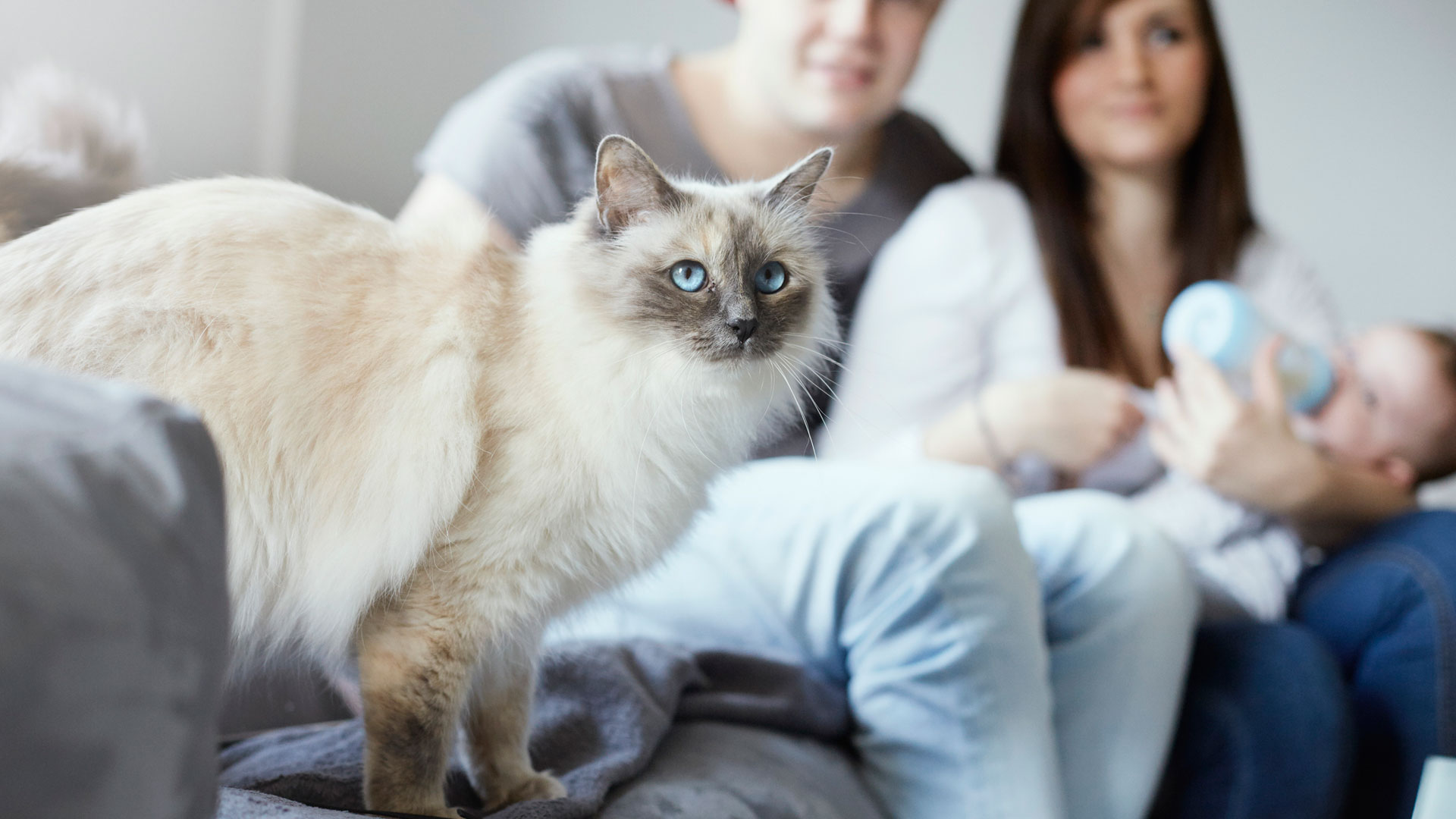
Get the best advice, tips and top tech for your beloved Pets
You are now subscribed
Your newsletter sign-up was successful
If you need to know how to introduce cats and babies for the first time, well, congratulations! A new baby is a life-changing event for you, and it's good that you've thought about how its arrival might impact your kitty.
Cats aren't keen on change, and the arrival of a whole new creature in its home, making weird noises, generating strange smells and consuming its humans' attention, is going to be a massive upheaval for all but the most laid-back feline. However if you take the right approach and prepare effectively, you'll be able to soften the blow that the appearance of a real baby will have on your furbaby.
Read on to learn everything you can do to ensure that your cat and your baby have the best possible introduction and live in as close to perfect harmony as possible.
And if you're thinking way ahead and don't have a cat or baby yet but are planning on getting both, see our guide to the 10 best cats for kids and families; alternatively if you already have a child and want to know what are the best small pets for it to be pals with, we can help you out there too.
Preparing your cat for baby's arrival
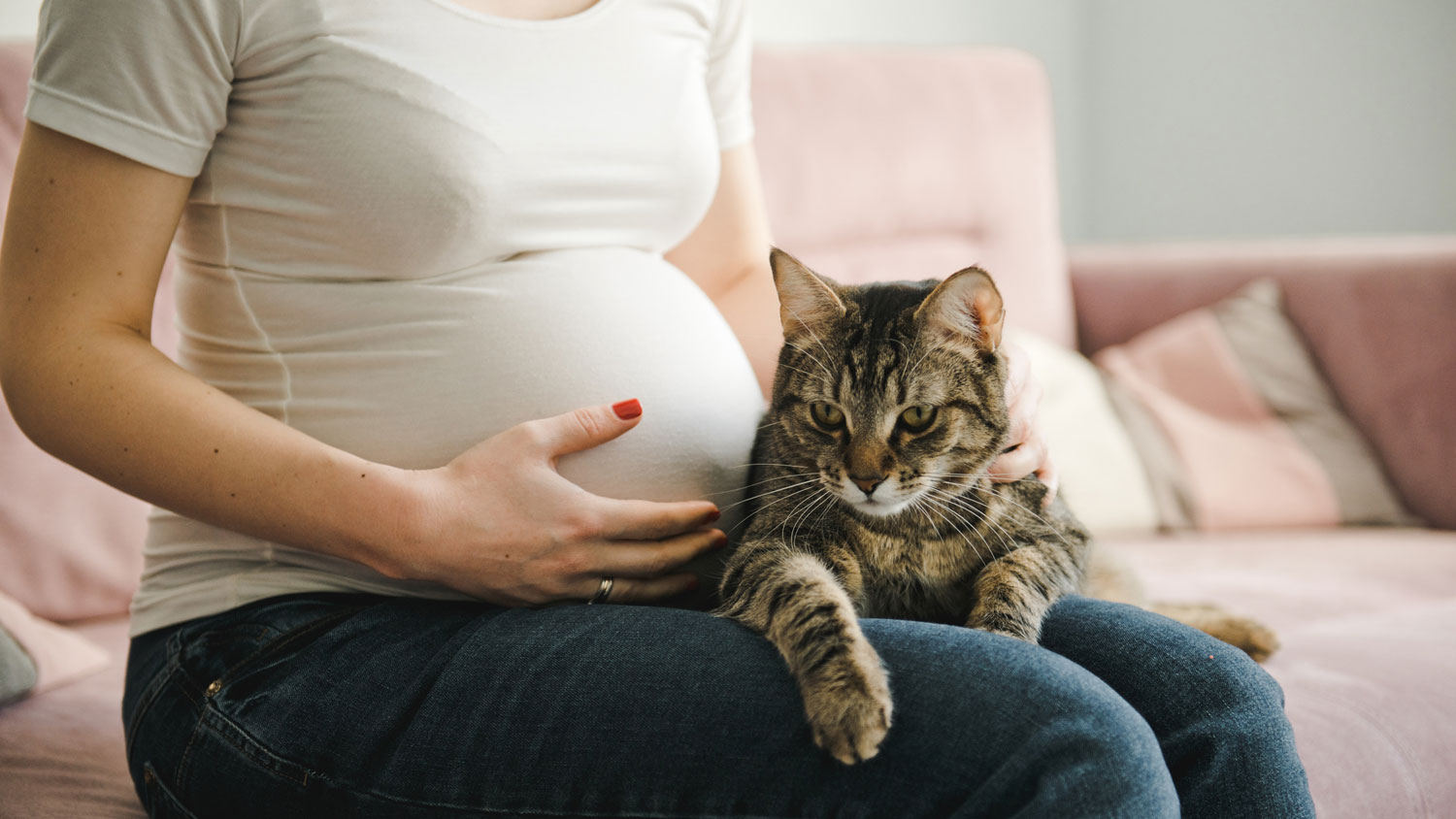
Because cats really don't cope well with sudden upheaval, the earlier you start preparing it for the arrival of a new baby, the better. If you can start preparations up to three or even four months before your due date, that'll give kitty plenty of time to adapt to what's to come.
Here are a few things you can do well in advance of the day you bring baby home:
Get your cat used to baby sounds...
Unless you're an exceptionally fortunate parent, your baby's going to regularly fill your home with all sorts of new noises that'll take your cat by surprise. But you can prepare your cat by playing recordings of typical baby noises, such as crying, gurgling and even screaming (all of which you can find easily on YouTube), for a short while every day.
Get the best advice, tips and top tech for your beloved Pets
Start off really quietly so that you can hardly hear it, and increase the volume level ever so gradually as your cat becomes accustomed to these new noises. Be sure your cat's completely at ease with the noise level before upping the volume; it could be a long process, so the earlier you start, the better.
... and baby smells and objects
Cats are really dependent on their senses of smell, and a sudden influx of new smells, such as baby milk, baby powder or baby soap and shampoo, could be thoroughly overwhelming. So again, introduce these gradually, one at a time, well before the baby arrives, and put them on your skin so the new smell mixes with your own, safe smell.
Similarly, baby paraphernalia such as cots, high chairs, play pens, toys and prams should be introduced gradually and in advance; you can soften the blow of all the new stuff by using a pheromone spray or diffuser such as Feliway.
Give your cat its own space
No matter how much preparation you put into acclimatizing your cat to a new baby's arrival, there are going to be times when it needs to get away, especially if in addition to the baby there's a never-ending procession of strange new visitors. So be sure to provide your cat with a safe and quiet space to retreat to if it all gets too much for it.
If you can provide your cat with its own room to hide in then all the better; however if that's not practical then you should at least ensure that it has a variety of safe or high-up spaces that it can call its own; our guide to the best cat trees can point you at some ideal safe spots.
And while we're talking about high-up spots, given that sooner or later your baby's going to start crawling or toddling around the home, it would be a good idea to start feeding your cat off the ground (perhaps on the kitchen table or a work surface), so that there's not a tempting bowl of cat food lying around for a curious youngster to investigate.
Get your cat a health check
One last thing you should do before the baby arrives is to take your cat to the vet for a health check; you'll want to make sure that it's in good condition and hasn't picked up fleas or worms.
This isn't just for the baby's benefit. If your cat's feeling under the weather for any reason (and cats, of course, are very good at hiding pain or discomfort), that could make it less able to cope with the massive changes that the arrival of a baby in your home will bring, and that in turn could lead to behavioral problems down the line.
Introducing your cat to your baby
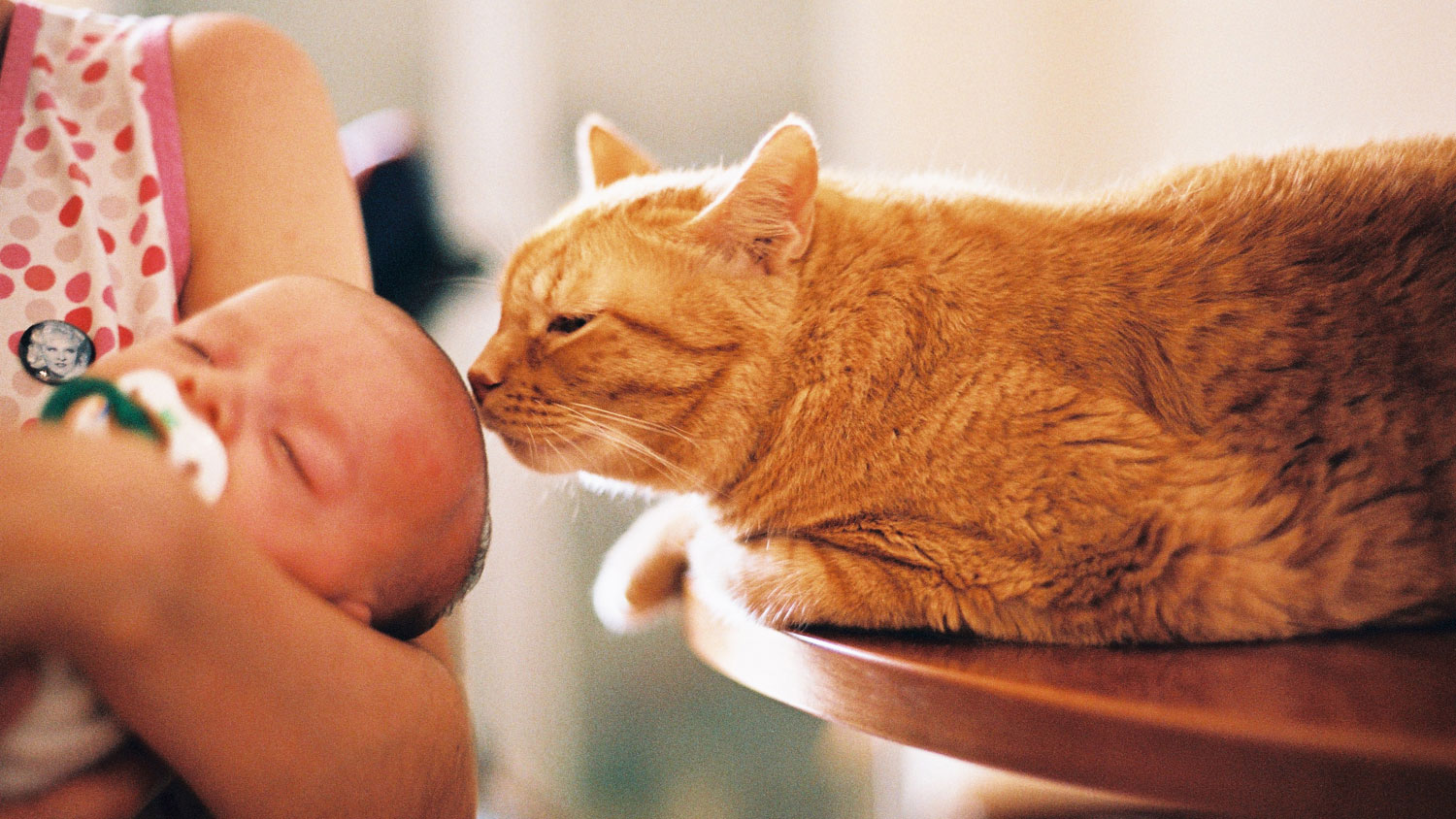
After all the lengthy preparations to ready your cat for the new arrival, the actual business of introducing your cat and your baby should be relatively straightforward (although, of course, where cats are concerned you can never be entirely sure of that).
First of all, you'll want the introduction to take place on neutral territory, which may be a challenge if up until now your cat has viewed your entire home as its territory. However a shared space such as your living room or bedroom should do just fine.
The secret is to let your cat take things at its own pace and not to force an introduction if it's not happy. So, hold your baby, and let your cat approach if it wants; if it wants to sniff the baby then that's a good sign, and you should let it do that. If everything's going well your cat will show a bit of interest in the baby for a little while, then lose interest and wander off, in classic cat fashion.
However if your cat's not so keen and runs away, that's okay too. Let it go and just carry on as normal, then try again another time after your cat's relaxed a bit; sooner or later it should get used to the presence of this new tiny human in the home.
Things to be aware of
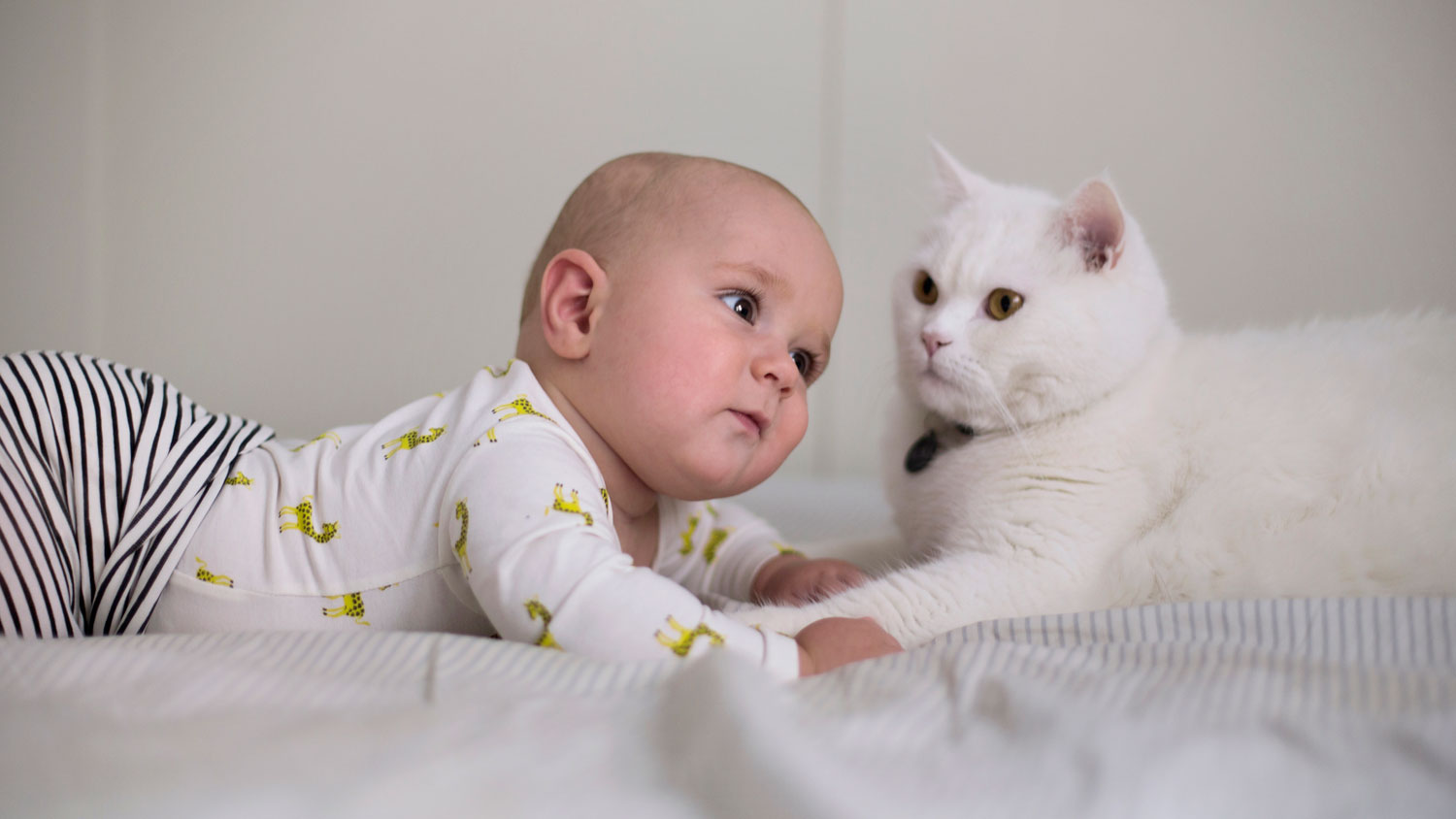
If the introduction goes smoothly then that should be a big weight off your mind. However going forward there are things you should keep in mind in order to ensure a happy and healthy co-existence between your baby and your kitty.
Safety issues
While your cat may well acclimatize to your baby's arrival quickly and without problems, you should still be mindful of safety issues. The big issue is that you should try not to leave your baby and cat together unsupervised, especially on the floor. They may be getting on splendidly right now, but you can never sure when something might happen to change your cat's mood.
Cats love to get everywhere, so to keep it out of the baby's nursery without having to shut the door, a screen door or a high pet gate would be a great investment. Similarly, a net for your baby's cot and pram will ensure it can sleep soundly without the cat coming to investigate.
And finally, be aware of where your cat doesn't like to be touched (usually around the tail and tummy), and be ready to step in when your baby and cat are together if your baby suddenly reaches for one of these sensitive areas. At the very least it could upset your cat, and matters could be made worse if it decides to retaliate.
Hygiene issues
Hygiene is of course paramount when you have a baby in the home, and with the added complication of a resident cat you'll need to make just a little more effort to keep everything clean and sanitary for everyone.
First up, remember to wash your hands thoroughly, with an antibacterial soap if possible, after interacting with your cat, whether you're playing with it, feeding it or grooming it.
Then, of course, there's the issue of cat litter. You may have already seen our article on pregnant women and cat litter, and with a new baby in your home you should be just as watchful when it comes to your cat's litter tray. Try to keep it away from an area your baby can get to, or at least switch to an enclosed litter tray that baby can't get into, and always use rubber gloves when cleaning it out.
Toilet issues are a two-way thing, though, and you should be just as careful with your baby's diapers. Don't leave dirty diapers lying around, especially on the floor; your cat may start to interpret areas where dirty diapers have been left as toilet areas, and treat them as such, which is something you definitely don't want.
How your cat might react
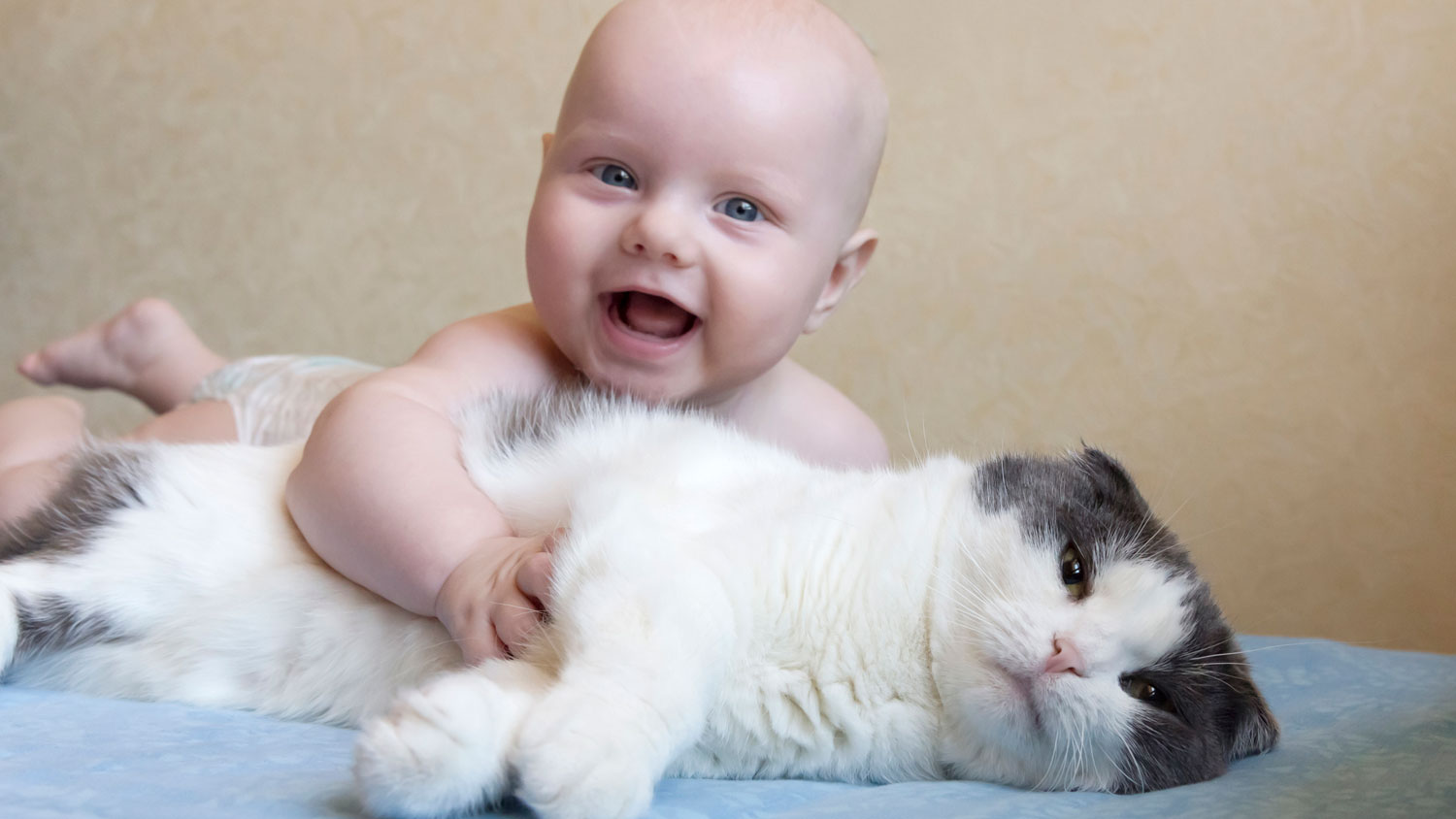
If you've prepared properly and introduced your baby and your cat in a relaxed manner, chances are that your cat will adjust to the new interloper in its home without too much difficulty. Nevertheless, all cats are different and you can never be entirely sure that it'll take this new situation in its stride, so you should keep an eye out for changes in its behavior.
Essentially, if your cat acts just like it did before baby arrived, is happy to approach your baby and appears to be relaxed and comfortable in its presence, then chances are that it's adjusted well to this big upheaval.
However if you notice changes to your cat's behavior, such as fearful body language, a reluctance to come into the home, toileting outside of the litter tray or spraying around the home, scratching furniture or just interacting with you a lot less (or a lot more) than it used to, then it may well be having difficulty coping and you'll need to take action to ensure a happy cat. Our guide to seven common cat behavior problems and how to solve them can help; alternatively you may want to consult your vet or go in search of a pet behaviorist.
Hopefully, however, it won't come to that, and your baby and your cat will get along wonderfully and bond even more as your baby grows up. Good luck!
Jim is a writer, performer and cat-wrangler based in Bath, who last year adopted a pair of sibling rescue cats who turned out to be effectively feral, and has spent a lot of time since then trying to get them accustomed to people (some success) and each other (ongoing project).

